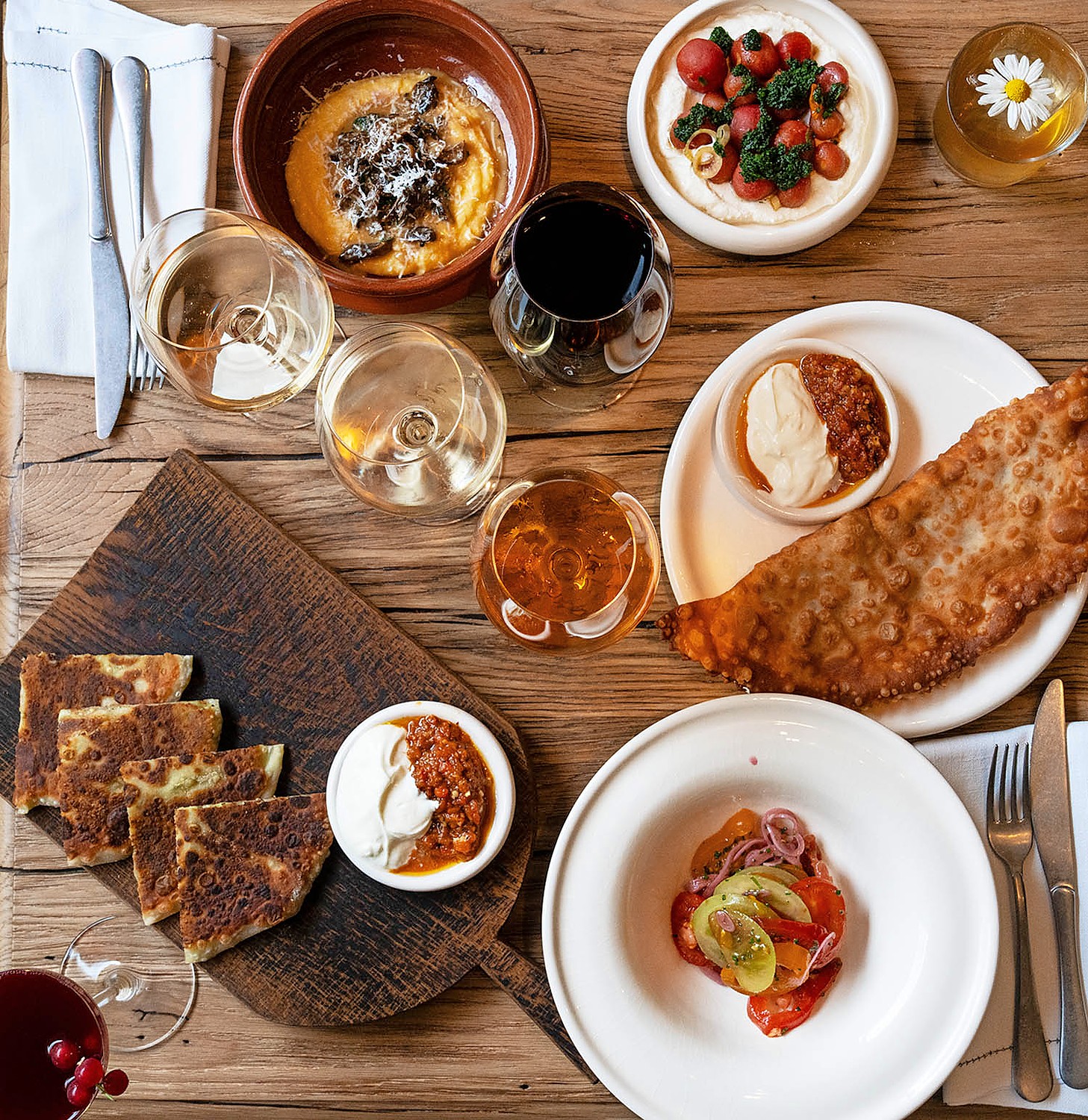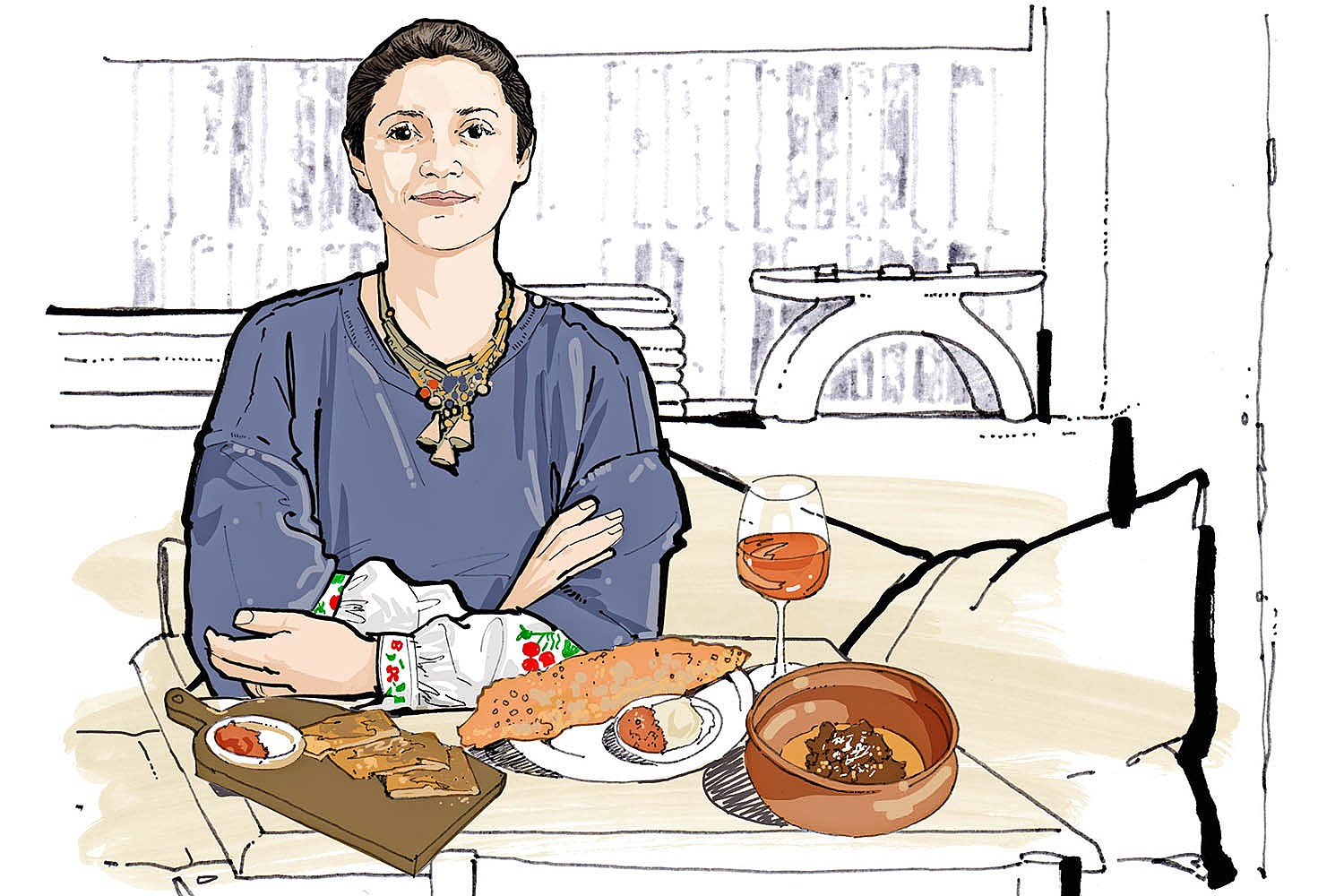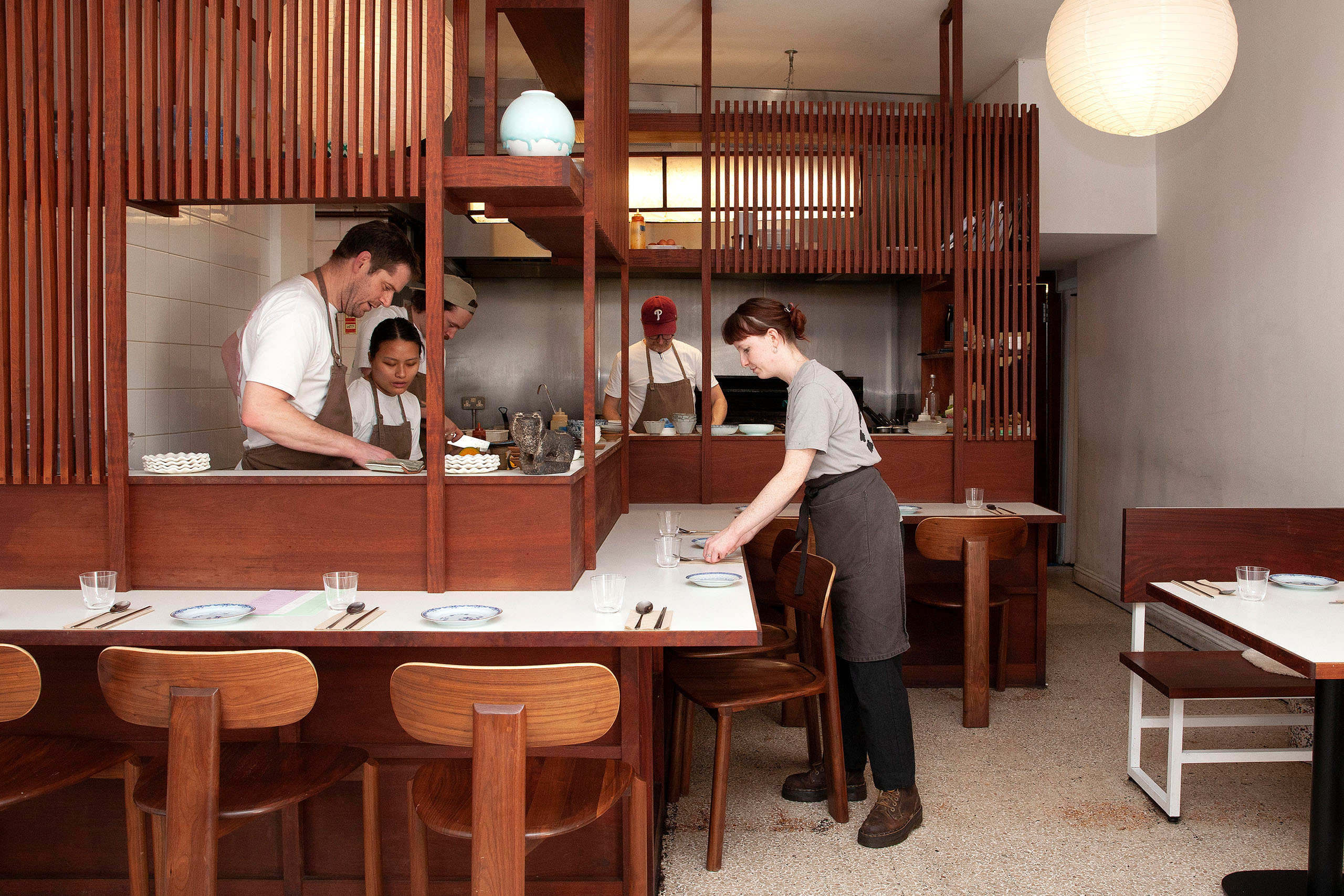Illustration by Lyndon Hayes
When meeting Olia Hercules for an early dinner at the east London Ukrainian restaurant Tatar Bunar, a dinner that will end up stretching out into a long and late one, all you have to say is, “I’m here to see Ol …”, and the waitress will know exactly who you mean. She shows me to a table for four, where Hercules, the Ukrainian chef, teacher, writer and activist, is waiting. There may be only two of us, but it turns out we need the space. The food, from the Bessarabia region in the south-west of Ukraine, is so good that it seems rude not to eat as much of it as possible.
Hercules, busy in the days before she will publish her memoir, Strong Roots, thinks that it is Wednesday, but the waitress confidently informs us that it is a Tuesday. Hercules is not sure whether to drink. “Wednesday would have made it more attractive,” she says. The waitress shrugs: “Tuesday is small Wednesday.” So we order wine, also all from Bessarabia. “An importer appeared after the full-scale invasion, and it’s really good wine, and they’re still functioning during all of this,” Hercules explains.
Strong Roots is not a traditional food writer’s memoir, though Hercules initially assumed that her publishers would want one. “They actually were like, this is going to be more of a war memoir, with food threaded through it.” It tells the story of Ukraine over the past 100 years, through the experiences of Hercules’ ancestors, beginning with her parents fleeing their home in 2022, and working backwards to her grandparents, who lived through war, famine, Russification, gulags and the fall of the Soviet Union. It is intricate, intimate and commanding. Hercules calls it “a complicated grief response”.
Cooking had always been Hercules’ “superpower”. She moved to the UK when she was 18, in the early 2000s, for university and had a brief stint as a film journalist, before retraining as a chef. She worked in various “intense” kitchens, and published her first cookbook, Mamushka, 10 years ago. When she was witnessing the beginning of Russia’s full-scale invasion of her home country, in February 2022, she found she could no longer eat or cook. Her parents were at home in Kakhovka and her older brother Sasha had enlisted in the army. “I was literally online from 12 o’clock at night until I passed out at six o’clock in the morning, watching Kyiv, where my brother was, seeing the explosions through Twitter, just scrolling: give me more, give me more.” Her husband, Joe, tried to make sure she ate, but her appetite was gone. “If I tried to cook, I would just cry, because cooking and eating has such a strong connection to my family.”
‘I’ve come to accept we’ll never see my mum and dad’s house in Ukraine again’
‘I’ve come to accept we’ll never see my mum and dad’s house in Ukraine again’
Her parents eventually fled Kakhovka and travelled to a house owned by her brother, in Italy. Hercules went out to meet them. To prepare for their arrival, she visited a local supermarket. “On a normal day, I’d be like, oh my god, amazing. They have two types of artichokes and puntarelle and these amazing ingredients.” But that day, she only had two ingredients on her mind. “Beetroot, beetroot, beetroot. Dill, dill, dill.” She made a “comedy borsch. An enormous pot. And I cooked it with enjoyment, for the first time in months.” She remembers thinking: “I’ve got it, my superpower is back. I just needed them to be out of the danger zone, and to know that my brother survived, defending Kyiv.”
Hercules makes some suggestions, then orders for us. To begin, a plate of punchy pickled tomatoes. She says that everybody in Ukraine makes fermented tomatoes in the summer. The chef sends over bread and a small dish of unrefined sunflower oil, which is nutty and toasted and impossibly moreish. The waitress explains that a woman in Ukraine makes it especially for Tatar Bunar. “I’m so glad you like it,” says Hercules. “It is the quintessential Ukraine. Ukraine in a bottle of oil.”
Hercules has spent much of her career challenging stereotypes about “eastern European” cuisine, puncturing the myth of stodgy potatoes and dumplings. “And overcooked cabbage,” she adds. In Strong Roots, she explains that boiled cabbage, for instance, came from Soviet canteens, rather than any Ukrainian tradition. Has she managed to change minds? She says it has been a bit of a challenge. “When I came here, 22 years ago, people were like, ‘Oh, you’re from Ukraine. So … Russia?’ Guys, why do you have this massive blind spot on the map? Ukraine is massive. Turkey is an hour’s flight from us. We’re in this belt of super-hot climate.” For Mamushka, she wrote up Ukrainian dishes from the south, zingy and fresh with herbs and vegetables, like the food we’re eating this evening. “But I’ve finally also embraced our winter dishes, which do include potatoes and dumplings, and banush, which we’re going to try. And cabbage, which is not overcooked, but delicious, braised, cooked by someone who cares.”
For mains, Hercules has lamb cheburek. She has two sons, Wilfred, who is five, and Sasha, who is 13, and named after her brother. The cheburek is Sasha’s favourite and she will take half of it home for him. For me, she chooses plachinda with bryndza, which Hercules describes as somewhere between feta and halloumi; Ukrainians love cheese. The banush is wonderfully rich: “You know how you cook polenta in water or milk? Ukrainians cook it in sour cream, or creme fraiche. That is the richness you’re feeling.” We have a cool, crisp tomato salad to balance it out. Her parents’ home had an orchard, and her mother grew tomatoes there. “I kid you not, I weighed a particular monster one summer, and it was 700g. It was fragrant, juicy, meaty, everything that a tomato should be. We used to slice them like steaks, and all it needed was a little bit of Maldon salt.” (Maldon was her go-to present for her relatives, whenever she went home. “All of my aunties said, ‘Bring that strange, flaky salt, please.’”)

Olia ate minced lamb cheburek, £17. Rebecca ate plachinda with bryndza, £18. They shared pickled tomatoes, £9, banush with wild mushrooms, £23, tomato salad, £7. Olia drank glass of Arbina, £16, glass of Odesa Black, £12, gin and chamomile, £13. Rebecca drank two glasses of Telti-Kuruk, £13 each, vodka and cherry, £13
Hercules has done so much to popularise Ukrainian dishes in the UK. Has she taken anything back, apart from salt? “My husband was born in Cambridge, he’s very English in a way, and he cooked this incredible Sunday roast for my family.” She laughs. “He made yorkshire puddings, and my auntie’s mind was blown. And I think she tried it, after we left.” She does an impression of her aunt, telling her she had made “the yorkshire pudding”.
Newsletters
Choose the newsletters you want to receive
View more
For information about how The Observer protects your data, read our Privacy Policy
Her parents’ house has been taken by Russians. A house across the street has been bombed. “I’ve come to accept that we will never see my mum and dad’s house again,” Hercules says, but leaving the garden they planted 30 years ago has been difficult. Growing is a big part of Strong Roots. Even in Ukraine’s cities, she explains, people haven’t lost their connections to “growing, to cooking, getting together”. Everyone has a grandmother in the countryside that they’d be sent to for the summer. Hercules’ grandmother, Liusia, was a child when, in 1931, she, her mother and her siblings were deported from Bessarabia to northern Russia, transported on a train to live under brutal conditions. When Liusia eventually returned home, she got a job at a flower factory, growing roses. “It saved her,” says Hercules. “That’s what Strong Roots is really about, your stem. Even if it breaks, or if the petals will be blown off by a storm, we will still prevail and something new will grow out of it.”
When Hercules was growing up, her family (“we don’t even call it extended family, we just say family”) would get together at Liusia’s house in the summer, and there would be drinks and storytelling, sometimes with laughter, sometimes with tears, often with both. “These stories became really cinematic in my head. I think that’s why I’m doing what I do. This combination of food and storytelling was second nature.”
The waitress asks if we would like dessert. “Is there any kind of cocktail situation?” Hercules asks. Tuesday is small Wednesday, after all. Before we leave, almost four hours after we sat down to eat, the restaurant wants to take a photograph of Hercules. She poses in front of a wall with Ukrainian writing on it, “khai zhyve Bessarabia”. I ask her what it says. She translates: “Long live Bessarabia.”
Tatar Bunar, 152 Curtain Rd, London EC2, Tel 07771 013190. Strong Roots by Olia Hercules (Bloomsbury, £20) is out now. Order at observershop.co.uk for £16.20. Delivery charges may apply


